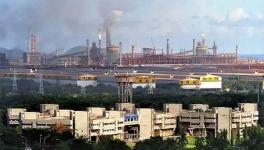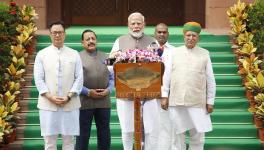Tribal Rights Compromised for National Highway in Andhra, Say Locals and Activists
Representational use only.
New Delhi: A 390-km long national highway project is being developed by the Andhra Pradesh government in the Eastern Ghats, in a predominantly tribal area, allegedly without proper public consultations. The proposed two-lane highway, National Highway (NH) 516-E, partially funded by the World Bank, will link Rajahmundry with Vizianagaram in Andhra Pradesh and affect several tribal-dominated villages alongside its alignment.
The allegations, made by locals and activists, have however been denied by the Union Ministry of Road Transport & Highways (MORTH) who have claimed total transparency in their operations. Though the project is 390 kilometres in length, ministry officials said it needs no Environmental Clearance as per law because none of the individual packages are over 100 kilometres in length, nor more than 60 metres in width.
In October, a group of activists wrote to the collectors of three districts of eastern Andhra Pradesh alleging non-compliance of laws in the execution of the project.
The proposed highway would run through three districts—Vizag, Vizianagaram and East Godavari. Two of these districts, Vizag and East Godavari, have regions under their jurisdiction that have been declared as Scheduled Areas by the Union government owing to preponderance of tribal population and their economic backwardness.
Lack of Public Consultation
An analysis of Environment Impact Assessment (EIA) reports for two sections of the proposed highway, that is, the Bowadra-Vizianagaram section and the Paderu-Araku section, shows that not only were many villages kept out of public consultations but the number of attendees in the hearings were abysmally low. Reports for these two sections prepared by the Andhra Pradesh Roads & Building Department are dated November and December 2019, respectively. These two sections will be funded by the World Bank.
As per the EIA report of the Paderu-Araku section, which is 49.37 kilometres long, public consultations were conducted in October 2018 only for Gram Sabhas of four of the nine affected villages. Each hearing was attended by 30-50 people. The cumulative population of all nine villages, as per Census 2011, is 16,307. However, the number of people from amongst this population who belong to the Scheduled Tribes category is 12,365, which is a whopping 75.82%.
This Paderu-Araku section of the existing road is in an unusable condition and roughly four per cent of it is double-laned. According to locals, the region through which the road would traverse is moderately rich in wildlife as well. Boars and bears are found in the forested areas of the region apart from isolated instances of sightings of cheetahs and tigers.
The proposed highway in this section will affect local vegetation, forest cover, agricultural crops and human habitations too at certain locations. Most of the land along the project road is adjacent to agricultural area, built up area and forest area, whereas there is nominal barren land.
The EIA reports further state that widening of the existing unusable road to a double-laned highway will require land acquisition that may lead to loss of property and livelihoods apart from loss of standing productive crops and vegetations.
Similarly, as many as 18 villages are located along the proposed highway’s Bowadra-Vizianagaram section, which is 26.94 kilometers long. Yet, public hearings through Gram Sabhas were held in March 2018 in only five of those villages in this section, according to the EIA report. Each hearing was attended by 15-30 persons only. The EIA report does not even mention the names of the people who attended these public hearings as is required under the law.
The entire highway project is being developed in nine packages, out of which 209 kilometres will be built with assistance from the World Bank. Officials said construction will soon commence on three packages for which work orders have been awarded.
“There are a number of coffee plantations alongside the proposed highway where farm owners are reluctant to part with their productive land. Even if land is acquired, a good rate of compensation is expected as per the new land acquisition act. Several bridges and culverts are part of the proposed highway project,” said Venkat Rao, a resident of Araku, expressing his concerns over the project’s impact.
“Also, where are the environmental safeguards for quarrying stones and boulders that will be used to build these bridges and culverts?” Rao asked.
Quarrying of minor minerals will also be required for black-topping of the entire stretch of the highway.
Alleged Violation of Tribal Rights
Activists say that public consultations are a must in all project-affected villages as per a judgement of the Andhra Pradesh High Court. In 2013, the high court had reversed a notification of the Union Ministry of Environment and Forests (MoEF), as it was called back then, ruling out the need for public consultants in case of linear infrastructure projects like roads, bridges, canals and so on.
“Notwithstanding the MoEF guidelines dated 5th February, 2013, Authorities responsible for implementation of PESA Act [Panchayats (Extension to Scheduled Areas) Act] in the state and central government are required to ensure consultation with the gram sabha or the panchayats at appropriate level as required under the PESA act even in case of projects like construction of roads, canals, laying of pipelines, optical fibers, transmission lines etc. in scheduled areas where linear diversion of use of forest land in several villages is involved,” stated the high court order.
The proposed highway would run in close proximity to coffee plantations and deciduous forests of Araku and Lambasingi. The project is also close to Borra Caves in the Ananthagiri Hills which are considered the deepest caves in the country. Locals from tribal-dominated villages have been asking for proper public consultations while activists have demanded the state government to ensure compliance with rules.
“Not conducting Gram Sabhas in all project-affected villages is a direct violation of the PESA Act. In the Samata judgement, the Supreme Court had held that transfer of land to non-tribal people in Scheduled Areas is illegal,” said Rebbapragada Ravi of mines, minerals & PEOPLE (mmP), a network of individuals and organisations affected by mining. “There is a need for black topping of the entire stretch of the highway. The quarry leases for minerals that would be needed for black topping have not been considered in the EIA report. These leases cannot be given to non-tribal people either as per law,” he added.
The Supreme Court had, in the landmark Samata judgement in 1997, held that in accordance with the PESA Act, “tribal autonomy of management of their resources including the prevention of the alienation of the land in the Scheduled Areas and taking of appropriate action in that behalf for restoration of the same to the tribals, is entrusted to the Gram Panchayats.”
When contacted, officials of the Andhra Pradesh Roads & Building Department told Newsclick that the project is being directly implemented by the central government through the MORTH and that the Department’s role is limited to land acquisition matters only. A senior official of the MORTH in Andhra Pradesh said the land acquisition procedure is underway – notification has been issued in some of the villages while many other villages are awaiting notification.
“Land acquisition is not complete in any case and compensations are yet to be awarded. The allegations that public consultations are not being conducted are totally baseless. Gram Sabhas are being conducted in each village. Since this is a project funded by the World Bank, total transparency and accountability are being maintained. These are Scheduled Areas and consent of local villagers for land acquisition is a must for the World Bank before it renders assistance for the project,” SK Singh, Regional Officer of MORTH in Vijayawada told NewsClick.
The writer is an independent journalist.
Get the latest reports & analysis with people's perspective on Protests, movements & deep analytical videos, discussions of the current affairs in your Telegram app. Subscribe to NewsClick's Telegram channel & get Real-Time updates on stories, as they get published on our website.
























